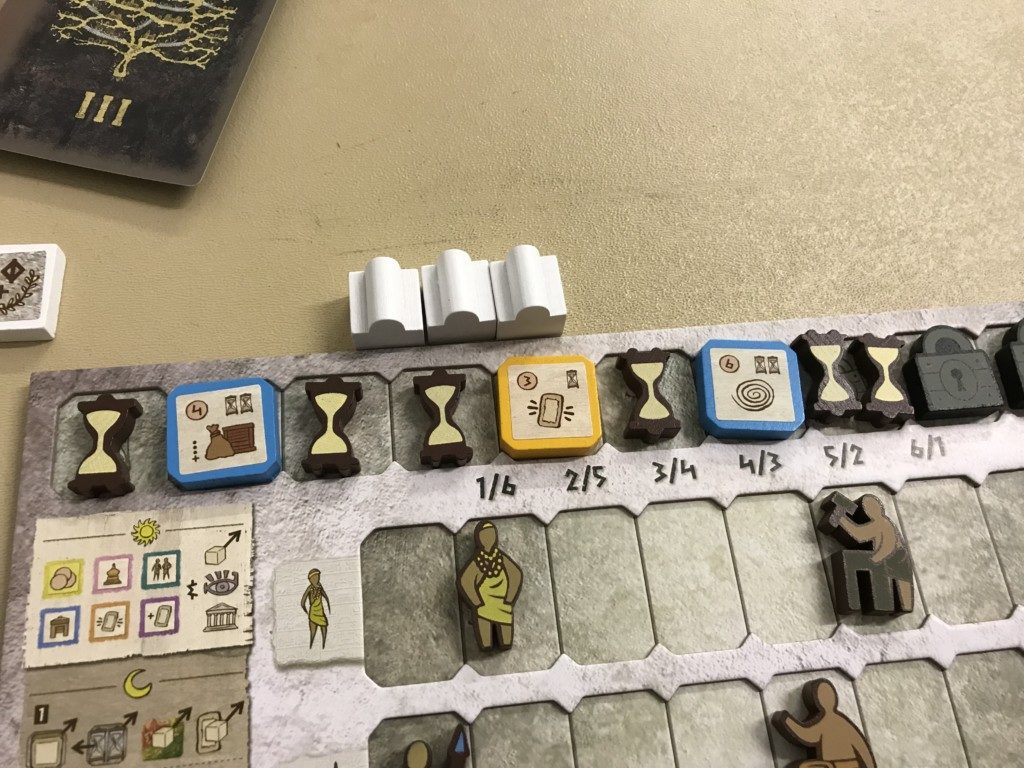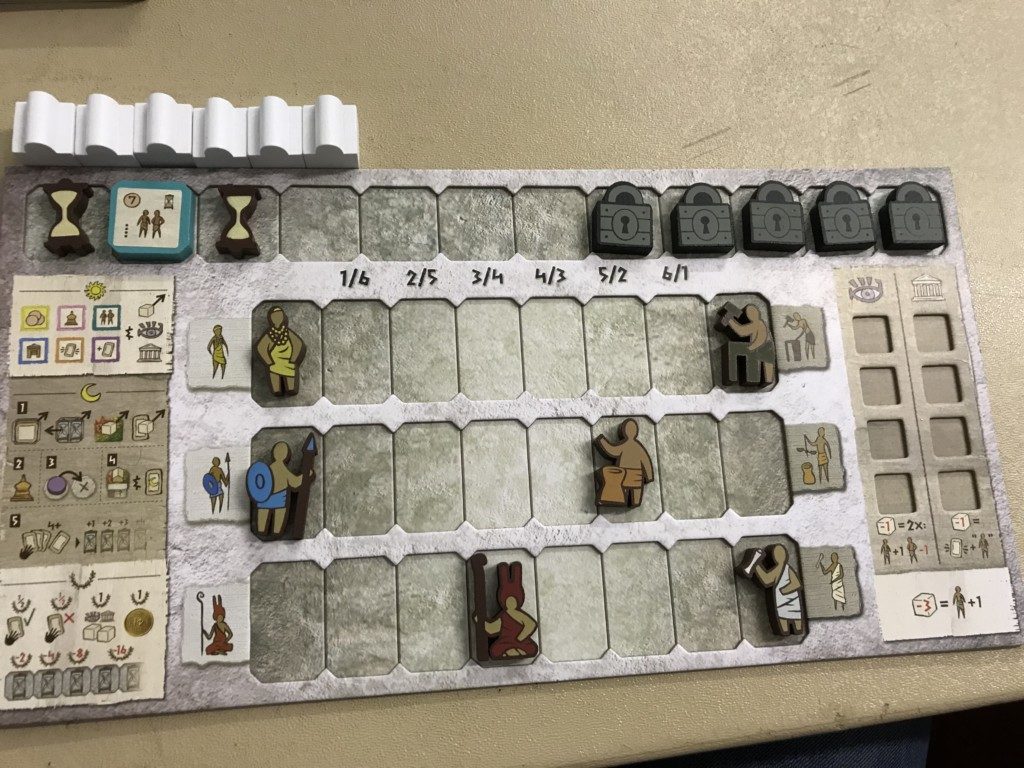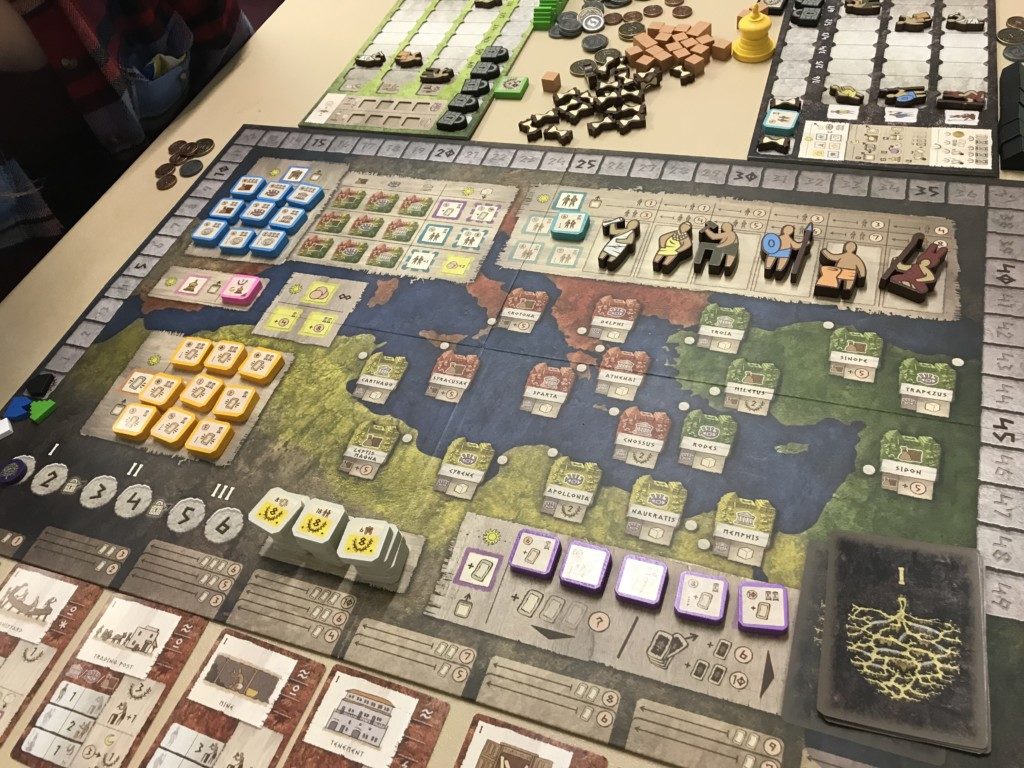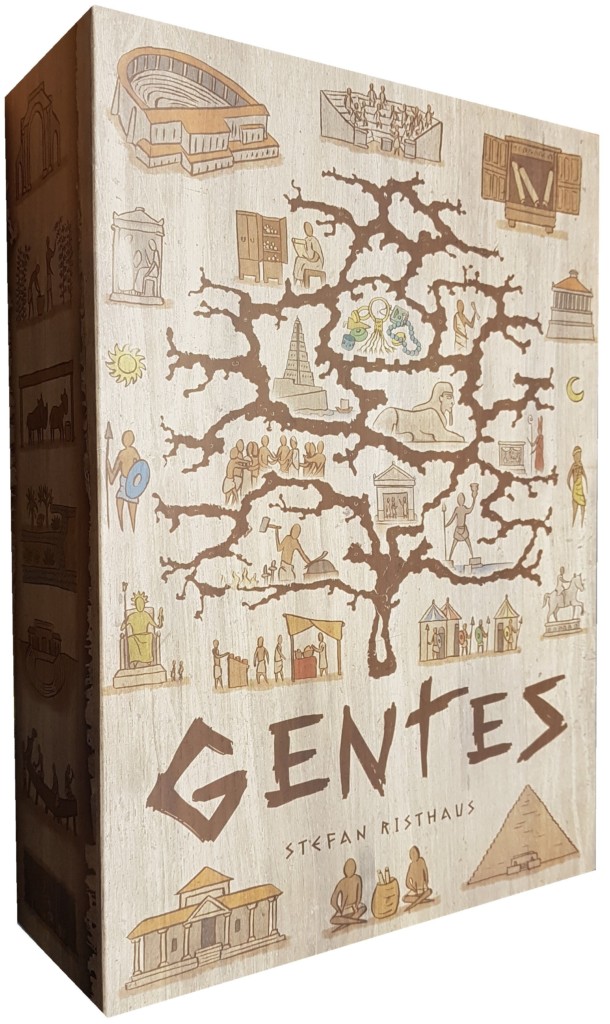Gentes is a civ-building game where you need to manage your time.
Also, pretty components.
“Gentes” is the Latin plural word for greater groups of human beings (e.g., tribes, nations, people; singular: “gens“). In this game, players take the role of an ancient people who are attempting to develop by building monuments and colonizing or founding new cities in the Mediterranean sea.
Gentes Game Play
This is a loose overview of the rules, not a tutorial 🙂
The board is laid out with action tiles all over it and players get a rather nice board. Players will also draft a hand of 3 cards to get the game started.
The game is played over 3 Eras of 2 Phases: Heyday and Decline
Heyday Phase
With the start player and going clockwise, players MUST take an action IF there is space on the time track otherwise they pass.
Actions are taken by either taking an action tile from the board or placing a cube on specific types of actions. Then time, represented by hourglasses, is added to the player’s track depending on the action.
You can see below, along the top of the player board where action tiles have been placed along with Hourglass tokens.

When adding an hourglass to the track, if you gain more than one in an action you can add two into one space which is important. Not only does it free up space for taking more action this round, but it will take up space for fewer actions next round.
Let’s look at those actions.
Actions
Tax Collector – Gain Time to gain Money.
Leader – Gain 2 coins and become the start player in the next round.
Philosopher – Train the population by moving them on your board so you know how many of each of the 6 types of people you have. The population is used to play Civilisation cards.
Scribe – Pay coins to take 1 or 2 cards from the discard pile or 1,2 or 3 cards from those face up in the display.
Navigator – Build a City on the board and gain resources from the space it’s on. Then activate and gain the reward of ALL your other buildings in the colour region you just built in.
Chronicler – Play a Civilization card from your hand if you meet the Population and Building requirements. You also gain points for different symbols on the played card plus the same matching symbol on cards you played previously.
Decline Phase
Once everyone’s time track is full you go into the decline phase.
Return all the tiles to the board. Players remove 1 Hourglass from each space on their track. This means if you decided to ‘double up’ on time you’ll have some slots filled for the start of this new round.

You activate cards that have an effect that triggers in the Decline phase.
The 6 phases are divided into 3 eras each with its own set of increasingly difficult-to-build but more rewarding building cards.
When you go into a new Era, you also remove a padlock off your player board freeing up an action space.
Game End
The game ends after the decline phase of the 6th round
You score half the value of points in your hand IF you meet their requirements and lose half their points if you can’t.
You gain points for cubes and money, lose points for Hourglasses left on the track and the player with the most points wins.
Theme
Yep, I see it. You build buildings that get more advanced as the years go on. You need to have certain types of people in your Tribe to have certain types of buildings. (What’s a School with no Teacher?)
So I see it there…
Setup & Rulebook
The setup is simple. Adding the tiles to all the spots on the board is a pain made worse by the fact you have to do it EVERY round as well.
The rest is straightforward. You put stuff out and lay out some cards.
The rulebook is pretty decent mostly. It mentions something on page 5 but doesn’t actually tell you enough about it until page 9. Little things like that.
Components & Artwork
It’s a deluxified edition so the components are good.
The art is nice. It’s cave painting-ish which is pretty cool. It has a nice look.

Ease of Teaching & Accessibility
It’s actually very simple. There are only really 4 actions most of the time so if you get those down along with the time track, you’re in.
All the actions available in the game are very simple.
I wouldn’t say it’s massively accessible though. It’s not a complex game but it’s more than a gateway game. Cards in hand are the only hidden information I think. Even if they are hidden any cards taken were all drafted face up so it wouldn’t be too much of a surprise if they were revealed to get help about their contents.
Gentes Summary
This is ANOTHER Euro where you do a thing to get things so you can do other things.
Managing the time is fun and seeing how you can push to get your required actions in is a nice challenge. Most of the actions let you pay more to take fewer hourglass tokens. So, do you have the cash to do this?
You won’t every round that’s for sure.
I never really felt like I had a target either. Sometimes I felt like I didn’t know what I needed to do. Add that to the limited time I had left and the cost of the remaining actions and it was very limiting at times.
Gentes is a nice game that works really well but do I want to play it over games like Gaia Project and Mombasa? No.
Jesta ThaRogue



Leave a Reply